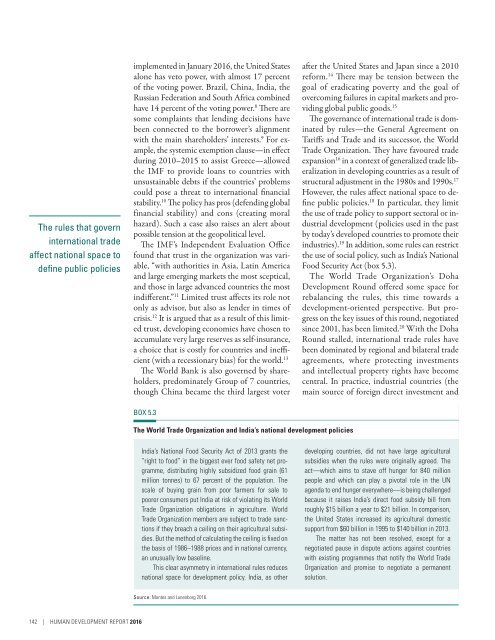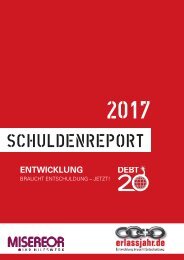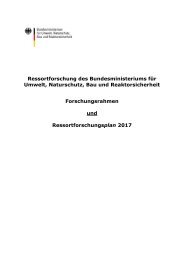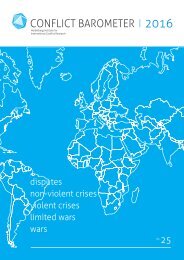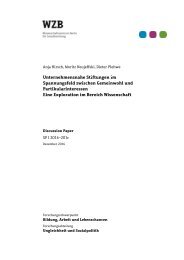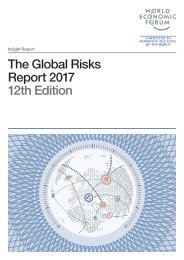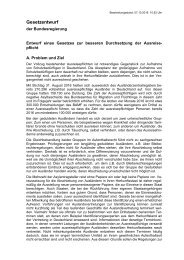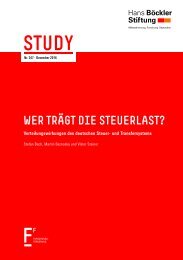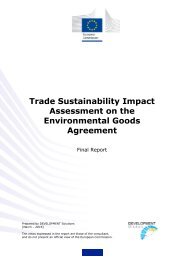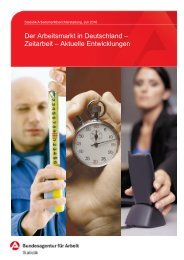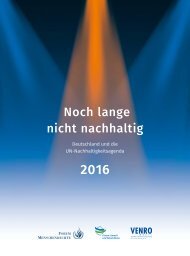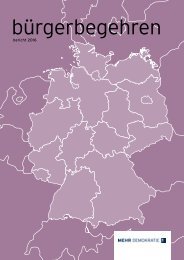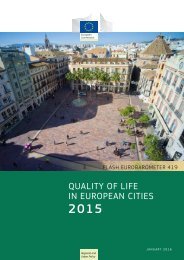Human Development Report 2016
6Tyccfrzw
6Tyccfrzw
Create successful ePaper yourself
Turn your PDF publications into a flip-book with our unique Google optimized e-Paper software.
The rules that govern<br />
international trade<br />
affect national space to<br />
define public policies<br />
implemented in January <strong>2016</strong>, the United States<br />
alone has veto power, with almost 17 percent<br />
of the voting power. Brazil, China, India, the<br />
Russian Federation and South Africa combined<br />
have 14 percent of the voting power. 8 There are<br />
some complaints that lending decisions have<br />
been connected to the borrower’s alignment<br />
with the main shareholders’ interests. 9 For example,<br />
the systemic exemption clause — in effect<br />
during 2010–2015 to assist Greece — allowed<br />
the IMF to provide loans to countries with<br />
unsustainable debts if the countries’ problems<br />
could pose a threat to international financial<br />
stability. 10 The policy has pros (defending global<br />
financial stability) and cons (creating moral<br />
hazard). Such a case also raises an alert about<br />
possible tension at the geopolitical level.<br />
The IMF’s Independent Evaluation Office<br />
found that trust in the organization was variable,<br />
“with authorities in Asia, Latin America<br />
and large emerging markets the most sceptical,<br />
and those in large advanced countries the most<br />
indifferent.” 11 Limited trust affects its role not<br />
only as advisor, but also as lender in times of<br />
crisis. 12 It is argued that as a result of this limited<br />
trust, developing economies have chosen to<br />
accumulate very large reserves as self-insurance,<br />
a choice that is costly for countries and inefficient<br />
(with a recessionary bias) for the world. 13<br />
The World Bank is also governed by shareholders,<br />
predominately Group of 7 countries,<br />
though China became the third largest voter<br />
after the United States and Japan since a 2010<br />
reform. 14 There may be tension between the<br />
goal of eradicating poverty and the goal of<br />
overcoming failures in capital markets and providing<br />
global public goods. 15<br />
The governance of international trade is dominated<br />
by rules — the General Agreement on<br />
Tariffs and Trade and its successor, the World<br />
Trade Organization. They have favoured trade<br />
expansion 16 in a context of generalized trade liberalization<br />
in developing countries as a result of<br />
structural adjustment in the 1980s and 1990s. 17<br />
However, the rules affect national space to define<br />
public policies. 18 In particular, they limit<br />
the use of trade policy to support sectoral or industrial<br />
development (policies used in the past<br />
by today’s developed countries to promote their<br />
industries). 19 In addition, some rules can restrict<br />
the use of social policy, such as India’s National<br />
Food Security Act (box 5.3).<br />
The World Trade Organization’s Doha<br />
<strong>Development</strong> Round offered some space for<br />
rebalancing the rules, this time towards a<br />
development-oriented perspective. But progress<br />
on the key issues of this round, negotiated<br />
since 2001, has been limited. 20 With the Doha<br />
Round stalled, international trade rules have<br />
been dominated by regional and bilateral trade<br />
agreements, where protecting investments<br />
and intellectual property rights have become<br />
central. In practice, industrial countries (the<br />
main source of foreign direct investment and<br />
BOX 5.3<br />
The World Trade Organization and India’s national development policies<br />
India’s National Food Security Act of 2013 grants the<br />
“right to food” in the biggest ever food safety net programme,<br />
distributing highly subsidized food grain (61<br />
million tonnes) to 67 percent of the population. The<br />
scale of buying grain from poor farmers for sale to<br />
poorer consumers put India at risk of violating its World<br />
Trade Organization obligations in agriculture. World<br />
Trade Organization members are subject to trade sanctions<br />
if they breach a ceiling on their agricultural subsidies.<br />
But the method of calculating the ceiling is fixed on<br />
the basis of 1986–1988 prices and in national currency,<br />
an unusually low baseline.<br />
This clear asymmetry in international rules reduces<br />
national space for development policy. India, as other<br />
developing countries, did not have large agricultural<br />
subsidies when the rules were originally agreed. The<br />
act—which aims to stave off hunger for 840 million<br />
people and which can play a pivotal role in the UN<br />
agenda to end hunger everywhere—is being challenged<br />
because it raises India’s direct food subsidy bill from<br />
roughly $15 billion a year to $21 billion. In comparison,<br />
the United States increased its agricultural domestic<br />
support from $60 billion in 1995 to $140 billion in 2013.<br />
The matter has not been resolved, except for a<br />
negotiated pause in dispute actions against countries<br />
with existing programmes that notify the World Trade<br />
Organization and promise to negotiate a permanent<br />
solution.<br />
Source: Montes and Lunenborg <strong>2016</strong>.<br />
142 | HUMAN DEVELOPMENT REPORT <strong>2016</strong>


